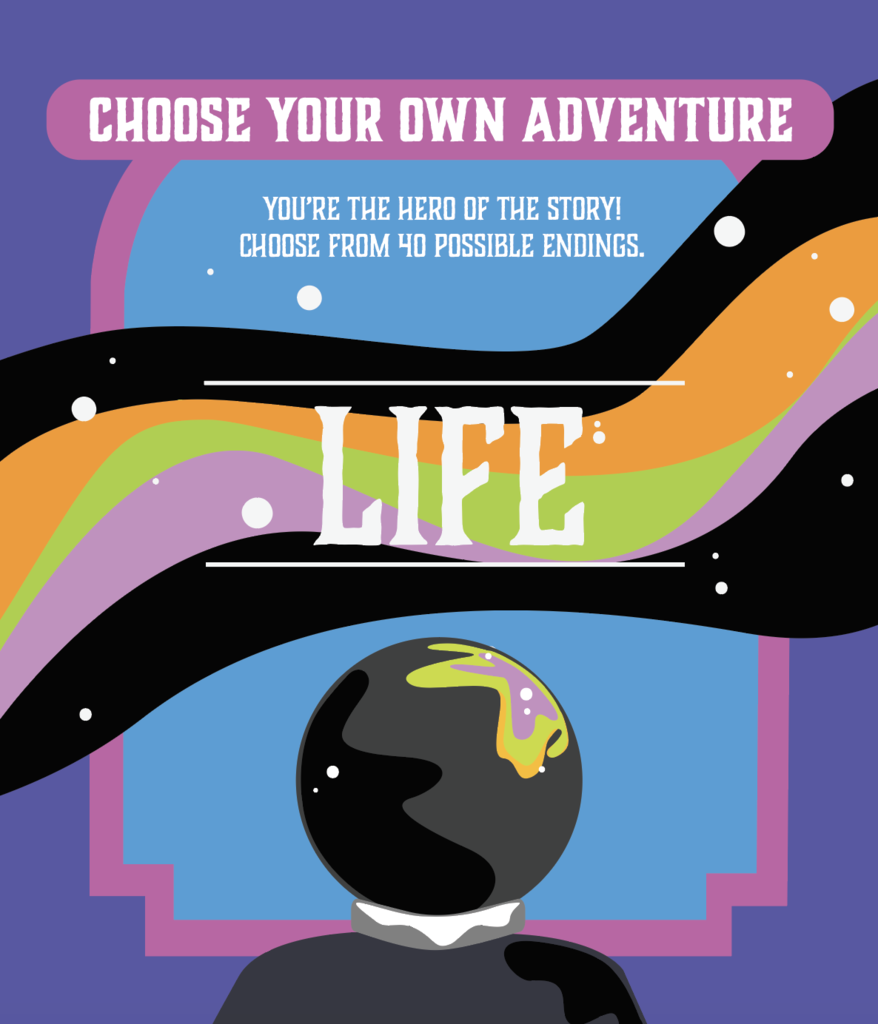Fiction but Fact: Life is one of those choose-your-own-adventure books

Life is like the “Choose Your Own Adventure” book series. Let me explain why.
“Choose Your Own Adventure” is a series of children’s books where each story is written from a second-person point of view. The reader assumes the role of the main character and influences the plot’s outcome by deciding their actions and behavior.
During the ’80s and ’90s, this series was one of the most popular children books. Originally published by Bantam Books (now Random House), the books are based on the concept created by Edward Packard in 1976. Packard developed the idea from bedtime stories he crafted for his daughters which featured the character, Pete, and the adventures he went on.
“I had a character named Pete, and I usually had him encountering all these different adventures on an isolated island,” Packard said in an interview with the Beaver County Times. “But [one] night I was running out of things for Pete to do, so I just asked what they would do.”
It was his two daughters who came up with unique paths for Pete to take as he ventured on, motivating Packard to build several endings for each path. Inspired by his daughters’ creativity and eagerness, Packard went on to apply his personal experience to his professional career.
Though this style of literature is catered toward young children, his books invite people of all ages to be their own hero. Having the audience pick from three to four options every two or three pages for what the main character does fosters a deeper and stronger relationship between the reader and the protagonist. Breaking the wall between fiction and the real world, a “Choose Your Own Adventure” book transports readers into an alternative universe, allowing them to experience new worlds and situations.
But, the greatest life lesson these books contribute is the simple yet profound truth that life is filled with adventures of your own choosing.
When applying this universal principle to daily life, it becomes evident just how complex and difficult it is to live by this motto. Our thoughts, our actions, our beliefs, our quirks and, most notably, our values are highly influenced by various factors surrounding us. From a young age, teenagers face all sorts of pressure manipulating them to change their attitudes and decisions. According to a publication by Parent Further, 90% of teens surveyed said that they had been influenced by peer pressure. While peer pressure may not always be negative, this phenomenon significantly affects adolescent decision making.
And USC is no exception to this trend.
From small decisions like attending the Visions and Voices event of the week because “everyone is going” or eating at Parkside Dining Hall because it supposedly has the best food (even though EVK is only a two-minute walk from you) to larger decisions such as supporting a particular presidential candidate solely because they are the most popular, we all succumb to peer pressure.
It is this societal constraint that builds the foundation of being easily swayed by those around you later in life, such as in your professional career or with your future family. We must all learn to stop making decisions based on the influence of others. Instead, we need to start making decisions for ourselves.
Though it’s more complex than that, I nevertheless underscore the importance of choosing your own path. I understand that decision-making is guided by several factors ranging from past experiences and cognitive biases to individual preferences and social circumstances. Yet, I believe that if we begin to prioritize being comfortable with making our own choices, we work toward creating our own real-life version of the books we loved to read when we were younger.
Both you and I should start being our own heroes. It is up to you to choose your own adventures, write new memories and narrate your personal success. So, go out there and start chasing your wildest dreams because maybe one day they’ll turn into a reality.
Ultimately you are your own protagonist in the story called life.
Aisha Patel is a freshman writing about fiction in parallel to current events. Her column, “Fiction but Fact,” runs every other Wednesday.

